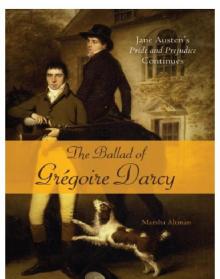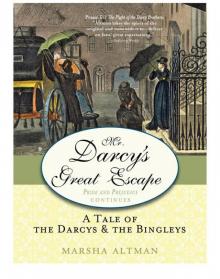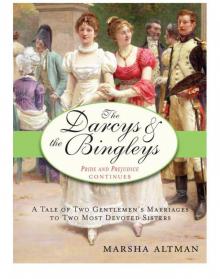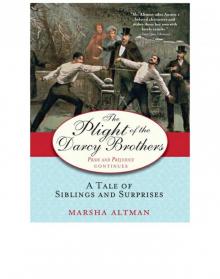- Home
- Marsha Altman
The Darcys and the Bingleys Page 4
The Darcys and the Bingleys Read online
Page 4
“How clever of you to quote poetry to placate my fears,” she said, but not in spite. She seemed somewhat relieved, in fact, and they were able for the first time in several minutes to move on, though this time they did not separate their hands. Conversation ceased, and there remained only their physical selves, their touch, and the surrounding forest.
“How many?”
This brought Darcy back from his dreamlike state. “What?”
“Surely it was more than one.”
“Oh God,” he said, blaspheming quite openly now in his terror. “It is not about numbers.”
“That many?”
“Perhaps you should just be grateful that I am not an inexperienced twit.”
“Like Mr. Bingley?”
He glared at her. On everyone else, this worked perfectly. On Elizabeth, it was just a further enticement. Blast! If not for her perfect eyes . . . and wonderful personality . . . and loving soul . . . and so many things . . . damn her! “As I would do anything for you, it is only fair that you would do anything for me. So I beg of you, please, to stop mentioning my good friend in the course of this conversation. Please.”
She smiled one of her charming smiles that spoke volumes. “Of course, if that is your desire.”
“Then the matter is cleared.”
“Yes.”
“And your fears are waylaid, at least to the extent that I can waylay them at this moment in time?”
“Perhaps,” she said, now toying with him, indicating a vast improvement in her mood. So she was placated.
“And you will mention nothing of this to Jane?”
“She is my sister! Does she not deserve to be comforted? She is more terrified than I was.”
“Then soothe her in some clever way that does not involve mentioning me or Bingley. You certainly have the wits to devise a strategy.”
She appeared to hesitate, but it was probably just to torment him further. “All right.”
“I have your promise?”
“You have my promise. I will speak to my sister in the most discreet way possible.” She frowned. “Yes, this will require some strategy.”
“Speaking of strategy,” he said, patting her arm. “I am afraid I must be off to London tomorrow.”
“That will leave us—”
“Time will pass just the same whether I am here or not,” he said. “And it seems as though our time together is limited these days anyway. But I assure you, this is something that cannot wait. I will be back tomorrow evening, but perhaps not in time for dinner.”
“And this mysterious errand will require you out at all hours?”
“I hope not. And don’t give me a look, because I will not reveal its nature.” He straightened his waistcoat in a mock fashion. “’Tis a gentlemanly matter.”
Elizabeth smiled at him. “I see.”
***
Surprisingly, the morning without Darcy passed with remarkable expediency. In fact, one could venture to say that it was passing too quickly, no offence meant to Elizabeth’s beloved Darcy. There was the final fitting for her dress, and the matter of the arrival of her sister Lydia in time for lunch.
Not that it should have been a “matter” at all for Lydia was not bringing her own husband along, claiming regimental duties he had and glossing over Mr. Bennet’s refusal to ever see Wickham on the grounds of Longbourn again. But there was another matter to be settled, that of her comforting Jane, and she decided quickly that it had to happen before Lydia’s arrival, or at least before Lydia found the time to talk to Jane—and knowing Lydia, it would be within moments of her arrival, as men were, in all likelihood, still her favourite topic of conversation. Despite her marital status, if her letters were any indicator, her interest in the latest man to behold did not wane with time.
Elizabeth had little time for pondering, so she did it expediently, staying up half the night with her own thoughts and those of her sister. Darcy had not truly removed all of her hesitations and fears about the . . . nature of conjugal union, but he had done an admirable job, and she could not imagine that the fastidious Mr. Darcy would ever do anything untoward, even in the privacy of his bedchambers. His standoffish nature did prevent him from outward displays of affection (and, in the beginning, any indication of affection entirely), but Elizabeth had come to realise that he was mildly uncomfortable in anyone’s presence, much less someone he was keenly interested in. Well, he was forgiven. What he lacked in social abilities he obviously made up for in passion, or at least, in the ability to express it with his eyes. She found it very hard, despite her mild terror at what she was about to enter, to look at his deep brown eyes and imagine he would ever do anything but make her happy.
These were not words she found so easy to express to Jane. Though she was deeply in love, Jane was still shy to admit her own feelings about the particularities of Mr. Bingley, and Elizabeth did not want to say something that would make her future brother seem lacking by complete accident.
By morning she had decided on an ally in the elaborate scheme Darcy had urged her to concoct. Charlotte Collins was perhaps her only true confidante beyond Jane, and if she was not willing to be part of an elaborate but very proper charade, she was helpless.
“This will be quite hard to explain,” Elizabeth said to Charlotte, after the seamstress had disappeared to acquire more ribbon. It did occur to her that, standing on a stool, wearing a virginal white wedding gown of considerable note and train, the conversation was even more inappropriate. “But I simply do not want my sister to . . . I don’t want her to . . . be terrified.”
“And you are not?”
She knew, without looking in the sizeable mirror before her, that she was blushing. “Perhaps a little. Mr. Darcy was very reassuring.”
Without pausing, Charlotte said, “Lizzy, your forwardness does not in the least surprise me, so there is no reason to be embarrassed. Though I am assuming, he was a perfect gentleman about the whole matter.”
“Yes, of course,” she said. “It wouldn’t even have come up if—if he hadn’t asked why I was so perturbed, if I hadn’t acted in such a manner as if I did loathe the sight of him. So it is my fault. But the point is, my concern is chiefly with my sister. I wish to reassure her without telling her the truth of my source of comfort.”
“Why ever not? It is the most logical conclusion.”
“Because Darcy made me promise.”
“Oh yes.” As usual, Charlotte understood everything. “He is the model of privacy.”
“Precisely.”
“So . . . you need an anonymous source—quickly.”
Elizabeth smiled. “Yes.”
“Well, I need hardly be anonymous, Lizzy. I have been married for nearly a year.”
“I would not presume—”
“Presume all you wish,” Charlotte said, much without regard. “I am but two months with child.”
“Charlotte!” And then it occurred to her that she was in a very complicated dress. “Please come to me so that I might embrace you without turning myself into a pin cushion. How long have you known?”
“A few weeks. I have told no one but Mr. Collins.”
They embraced, to the extent that they could, and Elizabeth could not help but notice that her friend looked truly ebullient. Perhaps she was not so ill married after all. “Though I must say in all honestly, I cannot imagine that you told Mr. Collins, and yet I have not heard of it from him, and at great length.”
“Some things are just between husbands and wives until their wives say otherwise,” Charlotte said with a twinkle in her eye. “The whole Rosings crowd will know in good time, but I have put my foot down on the matter and that is that.”
“Charlotte, I must congratulate you first on the obvious and second on taming Mr. Collins.”
“It was not so hard,” Charlotte said with a smile. “My husband is not deficient in all things. I will be a very willing subject to this experiment.”
It took Elizabeth a moment to grasp her m
eaning. “I have to confess, you have put a very nasty thought into my head.”
“Lizzy, every married couple has done the same. Your parents at least five times—at least.”
She hadn’t thought about it—or at least, she’d tried not to think about it, but one could logically conclude . . . she had to hold her head. “I think I am going to faint. Oh no, I am turning into my mother!”
“Should I get the smelling salts?”
“Do not mock me! I cannot stand it!” But at that moment, despite her agitated state, the seamstress reappeared, and she said quickly in a hushed tone, “So we will speak to Jane, before Lydia arrives.”
“Yes.”
She was relieved, but she decided she would be more relieved when she got the image of the awful Mr. Collins out of her head.
***
Charlotte did what Elizabeth recommended, despite her lack of experience on the matter, of reassuring Jane in the best and most complete manner without getting into the specifics of her own relationship, which she seemed very happy about but neither Bennet sister could accept as anything other than odious. The process took some time, and they were nearly late to lunch.
Lunch at Longbourn was an even more crowded and noisy affair than usual, as they were joined by the Gardiners, the Collinses, and Lydia Wickham, and there was certainly much to be discussed. Lydia embraced both of her sisters most enthusiastically, but the conversation kept going for all the preparations that still had to be made the next day. At the head of the table, Mr. Bennet attempted to create a fortification with the newspaper between him and the company, but Mrs. Bennet would have none of it. “Mr. Bennet, you cannot possibly be so relaxed when we are all so agitated!”
“You are correct in that assumption, Mrs. Bennet,” he said mildly. “I admit that I am not as relaxed as I appear to be, but somehow over the years I have become quite accomplished at appearing so, if I may say so myself. I owe it to much opportunity for practice.”
Elizabeth giggled and was not sure if her mother knew she was being insulted or even had time to acknowledge it. Lunch was a quick affair between appointments, and Elizabeth thought maybe they would escape Lydia altogether, but she managed to corner Jane and Elizabeth upstairs in the early afternoon.
“Dear God,” Jane said bluntly as Lydia began her monologue about the delights of matrimony. “Am I to be assaulted with advice and reassurance from every person in Hertfordshire? Is not any mystery to be left of it at all?”
That silenced them all completely for several moments.
“We are just concerned—”
“And I am overwhelmed by the kindness of my sisters, my mother, my friends, and my more distant relatives, but surely there is more to marriage than relations! Would someone like to give me advice about when to expect visitors or how to receive relatives?” She went on, to everyone’s stunned expressions, “Is Miss Bingley going to burst in and give me suggestions of the most untoward kind? Because please, let me at least put on a better gown for it.”
The strange silence of several gabby women, quieted entirely by the outburst of their beloved porcelain sister, was only broken when Elizabeth began to laugh. “Just when I thought I knew everything of my sister’s character, you have surprised me. Brava!”
They were only interrupted by Mr. Bennet’s voice at the bottom of the stairs. “Jane, are you all right?” Whether he had heard the particulars of the outburst was doubtable, but the very fact that his eldest daughter was shouting was probably of some concern to him.
“Yes, Papa! Everything is fine!” she called back, opening the door to her father. “We were just having a discussion.”
“I am very accustomed to discussions in this family; it seems I cannot avoid them no matter how hard I try. This, instead, sounded like an argument of some kind.”
“No, no, Papa,” Jane rushed to reassure her father, taking his hand. “We were just discussing . . . matrimony.”
“I can’t imagine why not. It is the topic of the day.”
“And the specifics of matrimony,” Lydia cut in. “I will not stand to have my sisters go into their marriage beds without any idea as to what they are to expect.”
The elder Mr. Bennet blinked and then said slowly and carefully, “Oh.” After a pause, he added, “Well, I will be in my study until it is time to leave for dinner. If you have any great need of me, I wish you the best of luck at finding an axe, because the door shall be soundly locked.”
***
Dinner at Netherfield was not officially the pre-wedding dinner, which would come the following night, but it was in all likelihood an unintentional rehearsal. The room was so crowded with guests that tables had to be brought together. At one end was the man of honour and the host, Mr. Bingley, and to his immediate left, Mr. Hurst in Darcy’s usual place, for his friend had yet to return from London. (He broke the news to Elizabeth politely and quickly as they arrived.) On his right were his sisters Caroline and Louisa, the former constantly requesting the wine to be passed. Then there were the Bennets, all seven of them; the Gardiners; the Collinses; and the Lucas parents. All pretences for coherent conversation were quickly abandoned, as one could hardly shout across the table without being rude to the person next to them, and the atmosphere was undeniably cheery. Elizabeth contented herself seated between Jane and Georgiana, her sister and sister-to-be, though she did keep an unintentional eye on the door. Only when it began to rain rather badly—so noticeably that it could be heard in the background of the clamorous dinner—did Elizabeth begin to worry.
“Do not worry,” Georgiana said quietly. “This is not the first time my brother has been caught in the rain, and I can barely believe that he would allow it to alter his plans.”
“I wish he would, for his own safety, be caught in Town rather than in a downpour.”
“He is Fitzwilliam Darcy, and he has quite a resilience. He once rode all the way from Pemberley to Liverpool in the middle of the night, stayed only a few hours, and then returned the next evening. I believe his clothing had to be disposed of.”
“Oh yes,” Colonel Fitzwilliam said, at Georgiana’s other side. “I remember that well. I’m surprised you remember it at all. He was but seventeen, so you must have been—”
“Pray, I never did learn the reason,” Georgiana said, and winked to Elizabeth, knowing full well she was just as curious.
Fitzwilliam grunted, “Humph. Well, um, it is not for me to say. It was connected to some boyhood prank, I believe. That and he was at the age where he was quite sure he was the best rider in all of England—you know, the time in a man’s life where he feels he is invincible. When he was needed in Liverpool for some reason, he jumped at the chance to be as brash and daring as possible.”
“Mr. Darcy! Really!” Elizabeth exclaimed, having to restrain her voice so they were not overheard, even though everyone around them was engaged in their own conversation. “It does not seem like something he would do.”
“If you imagine that your betrothed has never done anything rash in his life, then you have no idea what he did to his aunt the evening before he proposed,” Georgiana said.
“Really? You must tell me!”
“Well . . . I suppose I shouldn’t, because I only heard it from Anne de Bourgh in later correspondence, but, apparently, when he heard from Lady Catherine that you had refused to swear you would never marry him, he made her repeat it several times, as if he had a hearing deficiency, before thanking her for aiding him in his quest to win your hand. She wouldn’t stand for it, of course, so he left her alone in his London apartment while he rode off to Longbourn! In the middle of the night!” Georgiana giggled. “Somehow I imagine you can believe it.”
“I can. Though before that day, I would have not,” Elizabeth admitted.
Dinner seemed to pass too slowly, perhaps out of her growing concern for Darcy. When it ended there was hardly a change in situation, because they were all stuck there but for the weather. Card games and the pianoforte diverted them, and t
he men removed to the study for cigars. Eventually, though everyone was enjoying himself, Mr. Bingley had to make arrangements with his servants about who was to sleep where because there were those who were inclined to retire. Only a few were left at the card table when a rapping on the door shook them out of their conversation. The servants who stood by the door had retired, so Bingley did not wait for another to appear and opened the massive door himself.
It was, of course, Mr. Darcy, a completely soaked Mr. Darcy. When he removed his hat, a splash of collected water hit the floor, creating a considerable puddle in Netherfield’s hallway.
“Mr. Darcy!” Mrs. Bennet shrieked, as various servants rushed to attend him.
“I apologise,” he said, bowing very tiredly at the crowd assembling quickly before him. “There was a problem with the carriage, and I was forced to take the rest of the way on horseback.”
“On horseback!” Mrs. Bennet was livid. “Poor Mr. Darcy, off to bed with you, for the sake of your health! Please!”
Darcy paused, probably deciding if he wanted to be treated by his future mother-in-law as if she were his actual mother, but just quietly answered, “I regret my absence at dinner. Please excuse me.” He bowed again and allowed the servants to practically carry him off to his quarters.
“Mr. Bingley, we must have some food sent up to Mr. Darcy! A starving man is very easily taken ill!” said Mrs. Bennet.
“Of course,” Bingley said, still stupefied enough by Darcy’s sudden appearance to defend the competence of Netherfield’s well-paid staff to tend to Darcy properly. He did have the sense to turn to Elizabeth and say, “Perhaps, Miss Bennet, you shall oversee the preparing of food, if you are not too tired yourself from the late hour?”
She gave him a smile that obviously meant she was grateful that he read her mind on wanting to have an excuse to attend to Darcy. “Of course.” She curtseyed and quickly scurried off to the kitchen. As she left, she heard her mother further discuss Mr. Darcy’s health, apparently in fear that he would drop dead before the wedding.

 The Knights of Derbyshire
The Knights of Derbyshire Other Tales: Stories from The Ballad of Gregoire Darcy
Other Tales: Stories from The Ballad of Gregoire Darcy The Ballad of Gregoire Darcy
The Ballad of Gregoire Darcy Mr. Darcy's Great Escape
Mr. Darcy's Great Escape The Darcys and the Bingleys
The Darcys and the Bingleys The Plight of the Darcy Brothers
The Plight of the Darcy Brothers The Road to Pemberley
The Road to Pemberley